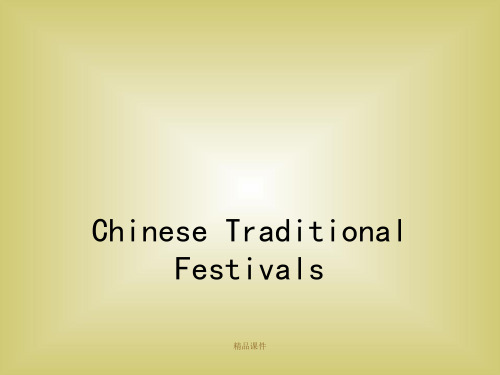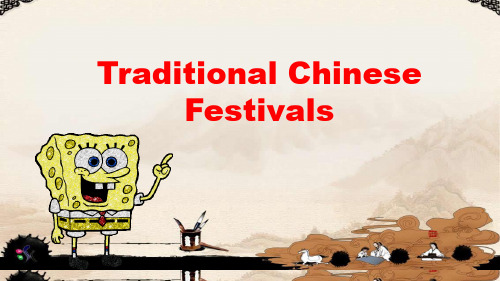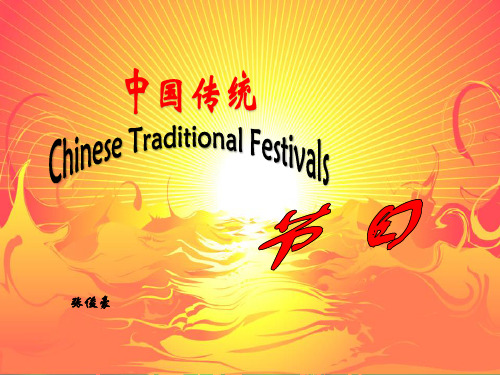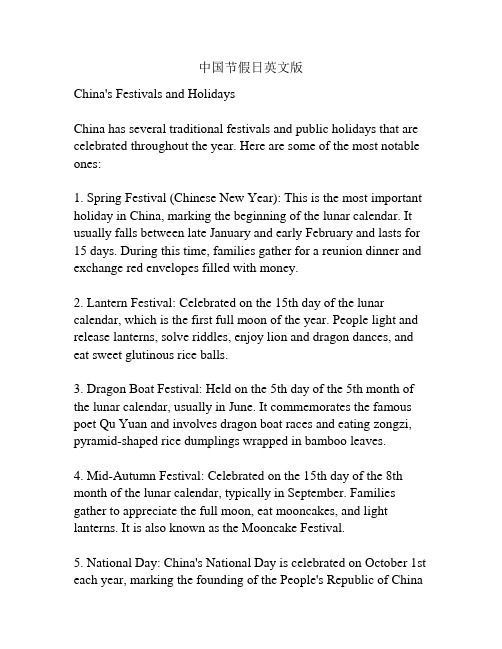中国节日介绍英文版本.docx
中国传统节日英文版

精品课件
Eat yuán xiāo or tāng yuán
精品课件
精品课件
精品课件
The dragon boat Festival
端午节 duān wǔ jié
5th day of the 5th lunar month
精品课件
qīng tuán(S)
zòng zi
Chinese Traditional Festivals
精品课件
Lunar Calendar 农历
nóng lì
精品课件
Chinese Zodiac
精品课件
Spring Festival 春节
chūn jié
Most important Get together
精品课件
Transport during the Spring Festival
精品课件
The Goddess Chang's fly to the moon 嫦娥奔月
Cháng’é bēn yuè
精品课件
Moon Cake 月饼
yuè bǐng
精品课件
Enjoy the glorious full moon with famlies or friends
(Xī’ ān 2016)
精品课件
The Lantern Festival 元宵节
yuán xiāo jié
huā dēng
精品课件
15th day of the 1st lunar month
The carnival of ancient China
精品课件
Customs Guessing lantern riddles
中国传统节日 英文版

The spring festival 春节 The Lantern Festival 元宵节 Tomb-sweeping Day 清明节 the Dragon Boat Festival 端午节 Double Seventh Day 七夕节 Mid-Autumn Day 中秋节
Double Seventh Day
——Chinese Valentine’s Day
Introduction
• full of romance • It' s on July 7th in the lunar calender each year • The Weaving Girl(织女) and the Cowherd(牛郎 ) in heaven would meet at the Magpie Bridge • Also called Begging-for-Dexterity Festival(乞 巧节)
• Many traditional customs and activities are held on the specified day by people in China and even by some people in neighbouring countries. Among these customs are dragon boat racing, eating zongzi, wearing a perfume pouch(香囊), tying fivecolour silk thread and hanging mugwort leaves(艾叶 ) and calamus(菖蒲).
Mid-Autumn Day 中秋节
中国传统节日介绍英文版

Origin Customs
Origin
Qing Ming is popularly associated with Jie Zi Tui, who lived in Shanxi province in 600 B.C. Legend has it that Jie saved his starving lord's life by serving a piece of his own leg. When the lord succeeded in becoming the ruler of a small principality, he invited his faithful follower to join him. However, Jie declined his invitation, preferring to lead a hermit's life with his mother in the mountains.
中国节日英文介绍

中国节日英文介绍以下是一篇关于中国节日的英文介绍:China is a country with a long history and rich culture, and there are many traditional festivals. These festivals reflect the traditions and values of the Chinese people, and are also an important part of Chinese culture. Here are some of the main Chinese festivals:1. Spring Festival: Spring Festival is the most important traditional festival in China, also known as the Chinese New Year. It usually falls in January or February and lasts for 15 days. During this period, people will clean their homes, paste Spring Festival couplets, set off fireworks, and eat reunion dinners with their families.2. Lantern Festival: The Lantern Festival is held on the 15th day of the first month of the lunar calendar, marking the end of the Spring Festival. On this day, people usually eat yuanxiao (glutinous rice balls), watch lantern shows, and guess lantern riddles.3. Qingming Festival: The Qingming Festival falls on April 4th or 5th of the solar calendar, and it is a traditional festival for ancestorworship and tomb sweeping. People will offer flowers, food, and wine to their ancestors, and clean up the tombs.4. Dragon Boat Festival: The Dragon Boat Festival is held on the fifth day of the fifth month of the lunar calendar, and it is to commemorate the patriotic poet Qu Yuan. On this day, people will eat zongzi (glutinous rice dumplings), watch dragon boat races, and hang mugwort and calamus.5. Mid-Autumn Festival: The Mid-Autumn Festival is held on the 15th day of the eighth month of the lunar calendar, and it is a festival for family reunion. People will eat mooncakes, appreciate the full moon, and tell stories about the moon.These are just some of the Chinese festivals. Each festival has its own unique traditions and cultural connotations, which together constitute the rich and colorful Chinese cultural heritage.。
中国的传统节日英语四篇(优秀)

中国的传统节日英语四篇(优秀)中国的传统节日英语篇一to the chinese people it is as important as christmas to people in the west.spring festival is the most importantand popular festival in spring festival ,the people usually clean and decorate their they go to the flower fairs to buy some flowers.during spring festival ,the adults usually give lucky money to often get together and have a big people eat dumpling for dinner.i love spring festival .中国的传统节日英语篇二hi! tom,i’m glad to hear that you are interested in traditional chinese festivals.my favorite festival is the mid-autumn festival.it usually es in september or october. on that day, our family members usually get together and have anice meal. after that, i always admire the moon and share mooncakes with my families.i love this festival because i like eating mooncakes. they are in the shape of a full moon. they carry people’s wishes to the families they love and miss.in short, the mid-autumn festival is a day of pleasure and happiness. i hope that my letter will help you know more about chinese festivals.yours,li hua中国的传统节日英语篇三when the traditional festival es, everybody is excited about it, because they will have holiday to relax. the meaning of these festivals is remembered by the old generation all the time, while some young people do not know. so when we enjoy the holiday, we need to know more about the traditional culture.大家都会很兴奋得知有传统节日将要降临时,因为他们会有假期来放松自己。
中国节假日英文版

中国节假日英文版China's Festivals and HolidaysChina has several traditional festivals and public holidays that are celebrated throughout the year. Here are some of the most notable ones:1. Spring Festival (Chinese New Year): This is the most important holiday in China, marking the beginning of the lunar calendar. It usually falls between late January and early February and lasts for 15 days. During this time, families gather for a reunion dinner and exchange red envelopes filled with money.2. Lantern Festival: Celebrated on the 15th day of the lunar calendar, which is the first full moon of the year. People light and release lanterns, solve riddles, enjoy lion and dragon dances, and eat sweet glutinous rice balls.3. Dragon Boat Festival: Held on the 5th day of the 5th month of the lunar calendar, usually in June. It commemorates the famous poet Qu Yuan and involves dragon boat races and eating zongzi, pyramid-shaped rice dumplings wrapped in bamboo leaves.4. Mid-Autumn Festival: Celebrated on the 15th day of the 8th month of the lunar calendar, typically in September. Families gather to appreciate the full moon, eat mooncakes, and light lanterns. It is also known as the Mooncake Festival.5. National Day: China's National Day is celebrated on October 1st each year, marking the founding of the People's Republic of Chinain 1949. It is a public holiday, and people often participate in various festivities, including fireworks displays and parades. These festivals and holidays hold significant cultural and historical importance in China and are celebrated with enthusiasm and joy throughout the country.。
Word——中国传统节日英文版

Traditional Festivals in ChinaT raditional festivals are important events in the life of every Chinese, beginning right from childhood. Festivals such as the Chinese New Year, the Dragon Boat Festival, the Mid-Autumn Festival, and the Winter Solstice are more or less evenly distributed across the four seasons. In China's traditional agricultural society, festivals served to mark the passing of time.L et's take a close look to these festivals:The Lantern FestivalT he Lantern Festival is on the 15th of the first lunar month. That night there is a full moon, and every household is decorated with colorful lanterns and prepares yuanxiao. Yuan Xiao, a kind of round dumpling make of glutinous rice flour sweet or salted fillings, which is boiled or fired. Yuan Xiao, literally "the night of the first full moon", which is another name for the festival. When night falls, people go into the street, where exquisite lanterns of diverse designs are hung. Some are pasted with riddles for the passers-by to solve.I t is said that after the Yuan Dynasty (1206-1368) destroyed the Jin (1115-1234), the band of the Yuan army celebrated the victory with gongs and drums. Since then beating gongs and drums has been a local tradition to express joy and happiness.I n the country and town, people celebrate it heartily. For some reason, there is often a bigger celebration in the rural areas, especially in the North. The most popular food for this festival is yuanxiao. Apart from yuanxiao, the customary foods vary from place to place. In Shanxi Province, people take yuanxiao tea, a sort of soup made of boiled flour mixed with vegetables and fruits; in Luoyang and Lingbao, Henan Province, people favor jujube paste; in Kunming, Yunnan Province, people prefer bean dough. Other folk customs of the Lantern Festival include attending the lantern fair, guessing riddles and performing traditional festivities.Dragon boat festivalVarious perfume bags glutinous rice dumpling (zongzi)The Spring festivalFamily CelebrationO n the last day of the old year, everyone was busy either in preparing food for the next two days, or in going to the barbers and getting tidied up for the New Year’s Day. Tradition stipulated that all food be pre-pared before the New Year’s Day, so that all sharp instruments, such as knives and scissors, could be put away to avoid cutting the "luck" of the New Year. The kitchen and well were not to be disturbed on the first day of the Year. The New Year’s Eve and New Year’s Daycelebrations were strickly family affairs. All members of the family would gather for the impo rtant family meal on the evening of the New year’s Eve. Even if a family member could not attend, an empty seat would be kept to symbolize that person’s presence at the banquet. At midnight following the banquet, the younger members of the family would bow and pay their respects to their parents and elders.Lai-SeeO n New Year’s Day, the children were given Red Lai-See Envelopes , good luck money wrapped in little red envelopes. On New Year’s day, everyone had on new clothes, and would put on his best behavior. It was considered improper to tell a lie, raise one’s voice, use indecent language, or break anything on the first day of the year. Starting from the second day, people began going out to visit friends and relatives, taking with them gifts and Lai-See for the children. Visitors would be greeted with traditional New year delicacies, such as melon seeds, flowers, fruits, tray of togetherness, and NIANGAO, New Year cakes.The moon festivalO n the 15th day of the 8th month of the lunar calendar, there is a Harvest moon. Some countries call it Harvest Festival. Here in China, they call it the Mid-Autumn festival, Chinese culture is deeply imbedded in traditional festivals. Just like Christmas and Thanksgiving in the West, the Moon Festival is one of the most important traditional events for the Chinese.T he Moon Festival is full of legendary stories. Legend says that Chang Er flew to the moon, where she has lived ever since. You might see her dancing on the moon during the Moon Festival.T he Moon Festival is also an occasion for family reunions. When the full moon rises, families get together to watch the full moon, eat moon cakes, and sing moon poems. With the full moon, the legend, the family and the poems, you can't help thinking that this is really a perfect world. That is why the Chinese are so fond of the Moon Festival.A s every Chinese holiday is accompanied by some sort of special food. on the Moon Festival, people eat moon cakes, a kind of cookie with fillings of sugar, fat, sesame, walnut, the yoke of preserved eggs, ham or other material. Some moon cakes are of very high quality and very delicious. An overseas tourist is advised not to miss it if he or she happens to be in China during the Moon Festival.T he Moon Festival is also a romantic one. A perfect night for the festival is if it is a quiet night without a silk of cloud and with a little mild breeze from the sea. Lovers spend such a romantic night together tasting the delicious moon cake with some wine while watching the full moon.T here are also many other traditional festivals in China, such as The Chinese Valentine's day(七夕节—中国情人节),Double Ninth Day (重阳节) and Water Sprinkling Day (傣族泼水节)H ope all the Chinese traditional festivals will bring you happiness.。
中国传统节日英语作文(大全5篇)

中国传统节日英语作文(大全5篇)第一篇:中国传统节日英语作文My Favorite FestivalWhat is the name of the festival?Spring Festival When is it?First day of the Chinese lunar calendar What do people eat?A big dinner niangaojiaozimeat fish What do people do? • Clean the house several days before the festival • Buy new clothes • Have a reunion dinner with the family on the eve • Visit relatives after the festival • Give “lucky” money to children Why do you like it so much? I think I can meet relatives.I know receiving “lucky” money makes me happy.I think that setting off fire crackers is interesting.I wonder if I can do these things next year.用下列句式造句,谈谈对不同节日的看法:I think…He thinks…She thinks… I believe…He thin ks…She thinks… I wonder…He wonders…She wonders…Spring Festival I know that Spring Festival is the most important festival for Chinese people.It comes in January or February.People usually clean their houses before the Spring Festival.People have a big family dinner on the eve of the Spring Festival.Young people bow to old people and wish them a happy new year.Old people give children “lucky money”.The next morning people put on their new clothes, go to see their friendsand relatives and say “Happy New Year” to each other.I think that Spring Festival is one of the most important festivals in China.I love it very much.Middle-Autumn Festival People believe that the Middle-Autumn Festival is one of the most traditional Chinese festivals, it is often celebrated in September or October.During the festival, family members get together and eat moon cakes.There are many kinds of delicious moon cakes.I think they are very delicious.On the evening of the Middle-Autumn Festival, people can enjoy the full moon in the dark sky.I like Mid-Autumn Festival because it makes me happy.Dragon Boat Festival The Dragon Boat Festival is a traditional festival in China.There’s a folk story about this festival.Many years ago, There was a poet called Qu Yuan.He loved his country very much.However, the king asked him to leave the country.He felt very sad.When he learned that another country had seized his country, he didn’t want to live any more.On the fifth day of the fifth lunar month, he jumped into Miluo River.The local people rowed the boat to save him, but it was too late.They didn’t want the fish to eat his body, So they dropped rice balls into the river.Nowadays, on this day, we watch dragon boat races and eat ZONGZI in memory of Qu Yuan.第二篇:中国传统节日英语作文The Dragon Boat Festival, also called the Duanwu Festival, is celebrated on the fifth day of the fifth month according to the Chinese calendar.People always eat rice dumplings and watch dragon boat races to celebrate it.The festival is best known for its dragon-boat races, especially in the southern places where there are many rivers and lakes.It’s very popular.The rice dumpling is made of glutinous rice, meat and so on.You can eat different kinds of rice dumplings.They are very delicious.And Dragon Boat Festival is for Qu Yuan.He is an honest minister whois said to have committed suicide by drowning himself in a river.Overall, the Dragon Boat Festival is very interesting!the Middle-Autumn Festival The Middle-Autumn Festival is one of the traditional Chinese festivals, it is often held in September or October.During the festival, family members get united and have moon cakes together.There are various kinds of moon cakes, such as bean paste, egg-yolk or meat.The shape of a moon cake is round as it symbolizes a big moon.Moreover, in the evening of the Middle-Autumn Festival, people get together in a vacant place, eating delicious moon cakes while appreciating the beautiful moon hanging in the dark sky.To conclude, the Middle-Autumn Festival is a very nice festival for Chinese st Qing Ming Festival, I return home to worship my grandfather.Qing Ming Festival is a folk Festival.In the past, In the past, the Qing Ming Festival was called “Arbor Day”.But Today, Chinese visit their family graves to tend to any underbrush that has grown.Weeds are pulled, and dirt swept away, and the family will set out offerings of food and spirit money.Unlike the sacrifices at a family's home altar, the offerings at the tomb usually consist of dry, bland food.One theory is that since any number of ghosts roomed around a grave area, the less appealing food will be consumed by the ancestors, and not be plundered by strangers.With the passing of time, this celebration of life became a day to the honor past ancestors.Following folk religion, the Chinese believed that the spirits of deceased ancestors looked after the family.Sacrifices of food and spirit money could keep them happy, and the family would prosper through good harvests and more children.Chinese Spring Festival celebrating the end of winter and the warmth of spring.It began in the last day of the lunar year, ends in the 15th day of lunar NewYear, and also is the Lantern Festival.During the Spring Festival, people use red lantern and Spring Festival couplets decorate a house, put on all kinds of colored clothes, often visit friendsand relatives or together eat dumplings, fish, meat and other delicious food.The children are looking forward to receiving red envelope money, and together they play each other the fireworks, with happy.Street with dragonand lion dance and some other carnival activities,CCTV will held the grand Spring Festival ntern Festival is a China’s traditional festival.It is celebrated on the fifteenth day of the first month of the lunar ntern Festival is one of the biggest holidays in China.Several days before Lantern Festival, people begin to make nterns are made in the shape of different animals, vegetables, fruits and many, other things.While making lanterns people usually write riddles on lanterns.On the eve of Lantern Festival, all the lanterns are hung up.On Lantern Festival people go outside to have a look at the lanterns and guess the riddles on the lanterns.Perhaps you call see some wonderful folk performances, Dragon Dance and New Younger.Everything is very interesting and everyone is very happy.Our life is rich and varied.生活就像海洋,只有意志坚定的人才能到达彼岸。
- 1、下载文档前请自行甄别文档内容的完整性,平台不提供额外的编辑、内容补充、找答案等附加服务。
- 2、"仅部分预览"的文档,不可在线预览部分如存在完整性等问题,可反馈申请退款(可完整预览的文档不适用该条件!)。
- 3、如文档侵犯您的权益,请联系客服反馈,我们会尽快为您处理(人工客服工作时间:9:00-18:30)。
羀中国节日介绍英文版中国节日介绍英文版
羈一、农历节日
农历正月初一春节 (the Spring Festival)
螃
农历正月十五元宵节 (Lantern Festival)
莁
农历五月初五端午节 (the Dragon-Boat Festival)
肀
农历七月初七乞巧节 (中国情人节) (Double-Seventh Day)荿
农历八月十五中秋节 (the Mid-Autumn Festival)
蒅
农历九月初九重阳节 (the Double Ninth Festival)
莄
农历腊月初八腊八节 (the laba Rice Porridge Festival)
膀
蒆二、阳历节日
膆1 月 1 日元旦( New Year's Day)
膃2 月 2 日世界湿地日 (World Wetlands Day)
芀2 月 14 日情人节 (Valentine's Day)
3 月 3 日全国爱耳日
袆
蚄3 月 5 日青年志愿者服务日
羁3 月 8 日国际妇女节 (International Women' Day)
莀3 月 9 日保护母亲河日
芇3 月 12 日中国植树节 (China Arbor Day)
莆3 月 14 日白色情人节 (White Day)
蚀3 月 14 日国际警察日 (International Policemen' Day)
蒀3 月 15 日世界消费者权益日 (World Consumer Right Day)蚈 3 月 21 日世界森林日(World Forest Day)
袄3 月 21 日世界睡眠日 (World Sleep Day)
螃3 月 22 日世界水日 (World Water Day)
蕿3 月 23 日世界气象日 (World Meteorological Day)
袅3 月 24 日世界防治结核病日 (World Tuberculosis Day)
薆4 月 1 日愚人节 (April Fools' Day)
蒂4 月 5 日清明节( Tomb-sweeping Day)
蕿4 月 7 日世界卫生日 (World Health Day)
芆4 月 22 日世界地球日 (World Earth Day)
羄4 月 26 日世界知识产权日 (World Intellectual Property Day)芁5 月 1 日国际劳动节 (International Labour Day)
虿 5 月 3 日世界哮喘日(World Asthma Day)
蚇5 月 4 日中国青年节( Chinese Youth Day)
蚆5 月 8 日世界红十字日 (World Red-Cross Day)
芄5 月 12 日国际护士节 (International Nurse Day)
蝿5 月 15 日国际家庭日 (International Family Day)
肈5 月 17 日世界电信日 (World Telecommunications Day)膄5 月 20 日全国学生营养日
肃5 月 23 日国际牛奶日 (International Milk Day)
衿5 月 31 日世界无烟日 (World No-Smoking Day)
葿6 月 1 日国际儿童节 (International Children's Day)
袅6 月 5 日世界环境日 (International Environment Day)
6 月 6 日全国爱眼日
袁
罿 6 月17 日世界防治荒漠化和干旱日(World Day to combat desertification)
薅6 月 23 日国际奥林匹克日 (International Olympic Day)
莃 6 月 25 日全国土地日
薀6 月 26 日国际禁毒日 (International Day Against Drug Abuse and Illicit Trafficking)
聿7 月 1 日中国共产党诞生日 (Anniversary of the Founding of the Chinese Communist Party)
羆7 月 1 日国际建筑日( International Architecture Day)
肅7 月 7 日中国人民抗日战争纪念日
蚃7 月 11 日世界人口日 (World Population Day)
腿 8 月 1 日中国人民解放军建军节(Army Day)
莇8 月 12 日国际青年节 (International Youth Day)
蒃9 月 8 日国际扫盲日 (International Anti-illiteracy Day)
蒂9 月 10 日中国教师节 (Teacher's Day)
膈9 月 16 日中国脑健康日
螈9 月 16 日国际臭氧层保护日 (International Day for the Preservation of the Ozone Layer)
9 月 20 日全国爱牙日
芅
膁9 月 21 日世界停火日 (World Cease-fire Day)
芈9 月 27 日世界旅游日 (World Tourism Day)
腿10 月 1 日中华人民共和国国庆节 (National Day)
蚃10 月 1 日国际音乐日 (International Music Day)
芄 10 月 1 日国际老年人日(International Day of Older Persons)
For personal use only in study and research; not for commercial use。
